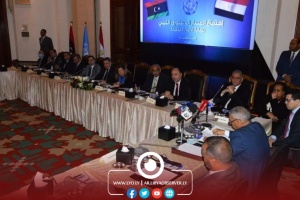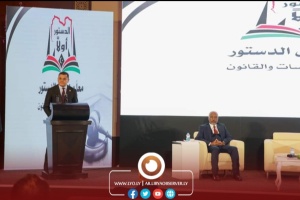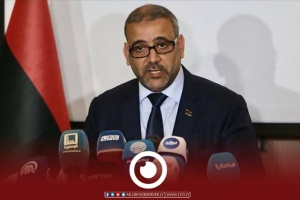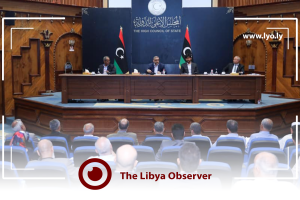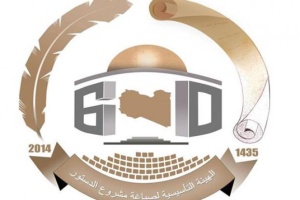Chapter three of the Libyan constitution draft that was approved by the Constituent Assembly on July 29
Libya Constitution – Chapter Three

Chapter Three
System of Governance Legislative Authority
Article 67: The Shura Council
The Shura Council shall consist of two chambers: The House of Representatives and the Senate. It shall have the authority to enact legislation, to ratify State public policy, the public plan for economic and social development, and the public budget for the State in addition to oversight of the work of the executive authority in the manner stated in the Constitution. First: The House of Representatives.
Article 68: Composition of the House of Representatives
The House of Representatives shall be composed of a number of members elected by general, free, confidential, and direct election based on the population, taking into consideration geographic distribution and ensuring the minimum level of representation for cultural linguistic components. This shall be in accordance with the law regulating the elections of the House of Representatives, provided that the age of a voter is no less than eighteen years old.
Article 69: Membership of the House of Representatives
Candidates for the membership of the House of Representatives shall be Libyans; Muslims; do not possess any other nationality; enjoy their civil and political rights; possess educational qualification and not younger than twenty-five years old on the day of candidacy and to be resident in the electoral district, as well as any other conditions specified by the law.
Article 70: Term of the House of Representatives
The term for the House of Representatives shall be four years as of the date of its first meeting. The election of the new House of Representatives shall be held during the ninety days preceding its expiration.
Article 71: Quorum and Voting
House of Representatives sessions shall not be considered valid without the presence of at least the absolute majority of its elected members. Decisions shall be taken with the same majority when endorsing draft and proposed draft, provided that the public budget law shall be endorsed by two thirds-majority.
Article 72: Draft and Proposed Laws
Each draft law submitted by the President of the Republic or the Prime Minister shall be referred to the competent thematic committees in the House of Representatives to examine it and submit a report on it to the House of Representatives within one month from the date of receipt. Draft laws submitted by at least ten members or in accordance with Article 42 shall be referred to the thematic committees for consideration within a period that does not exceed 60 days. In the case of rejection, the decision shall be justified. Draft laws shall have priority over proposals.
Article 73: Issuing and Publishing Laws
If the House of Representatives endorses a draft or proposed law, then it shall be referred to the President of the Republic within a maximum period of seven days for issuance and to order its publication in the Official Gazette, which shall take place within a period not exceeding fifteen days from the date of its endorsement. If the President of the Republic does not publish the law, then it is upon the President of the House of Representatives to issue and publish it with his signature. The new law shall enter into force two days after the date of publication, unless it states otherwise. The President of the Republic may return the endorsed law back to the House of Representatives with amendments. The House of Representatives may endorse it with the absolute majority of its elected members, with or without his amendments, within fourteen days of starting deliberations. The President of the Republic may not return any law endorsed by the Senate in accordance with Article 79 of the Constitution.
Article 74: Questioning and Interpellation
Each member of the House of Representatives may direct questions to the Prime Minister and Ministers and request their interpellation in accordance with the rules of procedure of the House of Representatives.
Second: The senate
Article 75: Forming the Senate
The Senate shall be composed of seventy-eight (78) members chosen by general, free confidential and direct poll by way of individual election where no voter shall be less than eighteen years old. For the purpose of applying this provision, seats shall be allocated among the three electoral districts as follows:
- Western region Tripoli thirty-two (32) members
- Estern region twenty six (26) members
- southern region twenty (20) members
This should guarantee representation of cultural and linguistic components by a reality of two members for each component. Geographical distribution within each constituency shall be taken into account with the limitations of the law.
Article 76: Membership of the Senate
Membership to the Senate shall follow the same conditions as membership to the House of Representatives. A candidate shall not be younger than forty years old on the candidacy start date.
Article 77: Term of the Senate
The term of the Senate shall be four years starting from the date of its first meeting. A member shall not be reelected for more than two terms. The new Senate shall be elected within 90 days preceding the end of the term of the current Senate.
Article 78: Quorum and Voting
Senate sessions shall not be considered valid unless with the presence of the absolute majority of its elected members. Decisions shall be taken with the same majority on issues stated in Articles 79 and 80, provide that among them are no less than eight members from each constituency.
Article79: Legislative Competence of the Senate
The Senate shall review laws referred thereto by the House of Representatives for endorsement or amendment in the following topics:
1- Financial system of the State
2- Local governance
3- Nationality and immigration
4- Elections
5- Natural resources and the environment
6- Proposed constitutional amendments
The Senate may request clarification from the concerned bodies regarding any topic within its competence.
Article 80: Senate Competence on Some Functions
The Senate shall endorse the nominations of the House of Representatives for the following positions:
1- Members of the Constitutional Court
2- Heads and members of the independent constitutional bodies.
3- Governor and Deputy of the Central Bank of Libya.
This shall be in accordance with the criteria of merit and aptitude so as to achieve the higher interests of the state within the period and according to the conditions defined by the law. The President of the Republic shall issue a decision to designate them.
Article 81: Joint Committee
If the two chambers have a dispute over a law set forth in Article 79, a joint committee of equal number from the two chambers shall be formed to resolve the dispute and propose a compromise text to be submitted to the two chambers for their endorsement and referral to the President of the Republic for its issuance. If the joint committee is unable to reach a compromise within a period not to exceeding thirty days from the day on which the draft was presented, it shall be sent to the Senate for endorsement with a two-thirds majority, then to the House of Representatives for referral to the President of the Republic for its issuance. Should this be not possible to accomplish, the endorsement of the law shall be postponed until the following term.
Article 82: Senate Consultation
The House of Representatives shall refer draft laws to the Senate for expression of its advisory opinion in their regard; and The Senate shall return them to the House of Representatives within a period no longer than thirty days from the day on which they were submitted. A number of no less than ten of the senate members are committed to propose new laws.
Third: General Provisions for the Two Chambers
Article 83: Non -Restriction of Delegation
Members of the Shura Council represent all of the people; it shall not be permissible to limit their delegation with restrictions or conditions.
Article 84: Oath of the Shura Council Members
Members of the Shura Council shall take the following oath in the presence of the their chamber prior to assuming their work: “In the name of Almighty God, I swear to be faithful to God and my country, to respect the Constitution and the Law, and to perform my work with all honesty and good faith".
Article 85: Dedication of Members of the Shura Council
It shall not be permissible to combine memberships of both chambers. Members shall carry out their work on a full-time basis. Their job shall be kept in accordance with the regulations of the law.
Article 86: Immunity
1- Each of the members of the Shura Council shall enjoy full liberty to express an opinion within the bounds of the rules of procedure of their respective chamber. 1.They shall not be questioned about votes, opinions, or speeches they express during council or committee sessions.
2- Either chambers may initiate parliamentary indictment to any of their member if there is sufficient evidence on the commitment of a crime of high treason, a serious breach of the Constitution, or crimes involving breach of integrity or honor during the fulfillment of their work. The member shall then be referred to the Attorney General to take the necessary legal procedures.
3- In cases other than flagrante delicto, criminal proceedings that affect the rights and liberties of members shall not be taken without prior permission from their respective chamber based on a written request from the Attorney General. If [the Council is]not during the term, permission shall be issued by the presidency, provided that the Council is notified in its first convening, in accordance with its rules of procedure.
Article 87: Rules of Procedure for the Two Chambers
Each of the two chambers shall issue its rules of procedure within a period that does not exceed thirty days from the date of their first meeting, and they shall be published in the Official Gazette. Each chamber must take into account complementarity and consistency with the other chamber when establishing the rules of procedure. The rules of procedure for the two chambers will specify the necessary sanctions to ensure regular attendance of its members.
Article 88: End of Membership
Membership of the Shura Council shall be end for one of the following reasons:
1- Inability to perform tasks
2- Resignation
3- Removal
4- Dismissal upon loss of any of the candidacy conditions
5- Death
A decision to terminate the membership shall be issued by the respective chamber to which the member belongs in accordance with the rules of procedure.
Article 89: Vacancy of a Seat in the Shura Council
In case a Shura Council seat becomes vacant no less than six months prior to the end of the term of the member for any of the reasons stated in the previous article, the law shall determine how the seat shall be filled.
Article 90: Headquarters and Provisions of the Convening of the Shura Council
The headquarters of the Shura Council, with its two chambers, shall be in the city of Benghazi. It may convene in any other place inside the country. Both chambers shall convene their regular sessions in accordance with the law in two regular terms the duration of each shall be five months. The terms of the two chambers shall be the same, provided that the first term starts within fourteen days from the date on which the final results of the elections are announced.
Article 91: Shura Council Meetings
The Shura Council with the majority of the members of both chambers shall meet under the chairmanship of the President of the Senate. In the event of his absence, the President of the House of Representatives shall assume this responsibility. If the President of the House of Representative is absent, the oldest member shall be the chairperson. This shall take place in the following cases:
1- The opening of the legislative term.
2- The call for a presidential election.
3- The oath taking by the President of the Republic.
4- Listening to the speeches of presidents.
5- Listening to an address by the President of the Republic on issues of national importance.
6- Holding consultative sessions for the two chambers.
The Shura Council shall ratify treaties and conventions by majority of its members.
Article 92: Extraordinary Convening of the Shura Council
The Shura Council shall hold an extraordinary session at the request of the President of the Republic or whoever succeeds him according to the provisions of the Constitution, or at the request of one third of the members of any of the chambers, in the following cases:
1- Approve the declaration or ending of a state of war.
2- Endorse a state of emergency and martial law.
3- Approve dispatching military forces outside the borders of the State.
4- Look into a specific agenda.
The President of the Senate or whoever succeeds him shall preside over this session. Decisions shall be adopted by the majority of the members present. The number of attendees should be at least half of the members from each chamber.
Article 93: Publicity of Sessions
Sessions of both chambers shall be public. Their deliberations shall be documented in minutes in accordance with their rules of procedure and shall be published according to the specifications of the law. Either one or both of the chambers may convene for an in-camera session with the approval of the majority of those present at the request of twelve members or a request by the president or the prime minister.
Article 94: Granting Decorations and Medals
Members of the Shura Council shall not be granted any decorations or medals during the duration of their membership.
Article 95: Devolution of Competences of One of the Chambers to the Other
If one of the chambers is dissolved, the functioning chamber shall inherit its competences in accordance with Articles 91 and 92, until a placement chamber is elected.
Article 96: Remuneration
Members of the Shura Council shall receive remuneration no higher than the ratio of 1:12 of the average salaries of state employees defined by law. Amendments to this law shall not be valid until the start [of term] of the Council that succeeds the one who issued the amendment.
Article 97: The Executive Authority
The executive authority shall be vested in the President of the Republic and his government in accordance with the provisions of this Constitution. Its headquarters shall be in Tripoli. It may hold meetings and take decisions in any other location inside the country.
Article 98:
First: The President of the Republic
The President of the Republic shall maintain the unity, independence and territorial integrity of the country. He shall care for the interests of the people and perform his competences. His responsibilities shall be defined in accordance with the provisions of this Constitution.
Article 99: Conditions to Run for the Presidency of the Republic
The following conditions shall apply to presidential candidates:
1- Libyan Muslim, and born to Libyan Muslim parents.
2- Had not acquired another nationality, unless this nationality had been renounced one years prior to the date of candidacy.
3- Not married to a foreigner.
4- In possession of a university degree or its equivalent
5- Not less than thirty five years of age.
6- Enjoy civil and political rights, and not convicted of a premeditated felony or a dishonorable or treacherous misdemeanor, even if rehabilitated.
7- Able to perform his functions.
Article 100: Electing the President
The President shall be elected by public, free, secret, and direct ballot, with the absolute majority of the valid votes of voters, and distributed geographically to constituencies according to the percentage determined by law.
The President of the Republic shall be elected one hundred and twenty days before the end of the term of the current president at the time of presidential elections. The final results shall be announced two weeks before the end of the previous term. In case it is not possible to hold presidential elections for compelling reasons or imminent danger, then this shall be proven through a decision by the Constitutional Court, and the Shura Council shall determine the necessary procedures and dates that are necessary for the subsequent conduct the presidential elections . A President shall not be reelected for more than two complete, consecutive or nonconsecutive terms. In the event of resignation, that period shall be considered a full presidential term.
Article 101: Term of Presidency
The term of presidency shall be five years from the swearing in date, and it shall be renewable for one time.
Article 102: Oath of the President
The President -elect shall take his oath before the Shura Council prior to assuming his duties according to the following formulation: “In the name of the Almighty God, I swear that I will perform my duties whole heartedly, I will respect the Constitution and the law, I will preserve the independence and unity of the country, and I will protect the interests of the people and the homeland.
Article 103: Vacancy of the Presidency Post
The post of the President shall be considered permanently vacant in the following cases:
1- Resignation by written notice addressed to the Shura Council.
2- Removal from office.
3- Loss of one of the conditions of candidacy as proven based on a ruling by the Constitutional Court.
4- Death
If the position is vacant due to the temporary absence of the President, the Prime Minister shall fill his position for a period not to exceed one hundred and twenty days. In the event that this period is exceeded, the position of the President shall be deemed vacant.
The Constitutional Court shall convene to officially establish the permanent vacancy of the position. The president of the senate shall assume the functions of the president, in case that is not possible the President of the House of Representatives shall assume the post within a period no longer than fifteen days from the date on which the decision of the Constitutional Court concerning the vacancy was issued, the Shura Council shall announce the opening of candidacy and the election of a new President within a hundred and twenty days.
Article 104: Competences of the President
The President shall be competent with the following matters:
1- Appointing the Prime Minister, government formation and making cabinet reshuffles.
2- Defining and guiding the general policies of the executive authority.
3- Calling for a referendum for the cases and under the conditions stipulated in the Constitution.
4- Convening the Shura Council to hold special sessions and identifying the issues that shall be addressed.
5- Issuing laws and ordering their publication in the Official Gazette in accordance with the Constitution.
6- Proposing draft laws.
7- Concluding international agreements of a technical nature in accordance with the law.
8- Accreditation of representatives of diplomatic missions of States and international organizations.
9- Granting medals and decorations according to the law.
10- Appointments and exemptions for senior positions in the Presidency of the State and institutions affiliated to it.
11- Declaring a state of emergency and requesting the declaration of martial law in accordance with the provisions of the Constitution.
12- Any other competences that the Constitution stipulates.
Article 105: Special Amnesty
Special amnesty shall be by a decree of the President of the Republic after considering the opinions of the Prime Minister and President of the Higher Judicial Council in a manner that does not contravene with the provisions of this Constitution.
Article 106: Supreme Commander of the Armed Forces
The President of the Republic shall be the Supreme Commander of the Armed Forces. He shall declare war and conclude reconciliation in accordance with the provisions of the Constitution.
Article 107: State Representation Abroad
The President of the Republic shall represent the State in its foreign relations. He may conclude treaties and conventions according to the Constitution.
Article 108: Decrees that have the Force of Law
In the event that the two chambers are not in session or the House of Representatives has been dissolved, the President of the Republic may, in a state of necessity or urgency, issue decrees that have the force of law as regulated by the law. Such decrees shall be submitted with justifications within seven days from the date of the convening of the following term of the House of Representatives for endorsement or repeal. It shall not be permissible to issue any decree that pertains to issues that fall under the competence of the Senate.
Article 109: Measures for Dissolution of Legislative Authority
Based on valid reasons related to obstruction of the policy of the State or development plan, or disruption of the budget without substantial justifications, the President of the Republic may put the dissolution of the House of Representatives or the Senate to a general referendum and in accordance with the following:
1- The President of the State must refer the reasons and justifications to the Constitutional Court for urgent advisory opinion on the seriousness and relevance of the reasons.
2- In the event that the court assesses the reasons as serious, and the President holds a general referendum resulting in favor of dissolving one of the two chambers, the President shall decree the dissolution. In the event that the referendum results in a “No”, the President shall form a new government.
Article 110: Impeachment of President
Upon a substantiated request by the absolute majority of the elected members of any of the two chambers, the House of Representatives or the Senate may charge the President of the Republic with high treason, serious breach of the Constitution, or commitment of a premeditated felony. The indictment shall be issued by two thirds majority of the Shura Council following an investigation conducted by the Public Prosecutor.
The President shall be suspended from carrying out his functions upon the issuance of the indictment until a verdict is reached on the case. This shall be considered a temporary vacancy of the post. The President of the Republic shall be tried before a special court comprising a president and four members, headed by the President of the Higher Judicial Council and with two most senior judges of the Court of Cassation and two most senior judges of the Courts of Appeals as members. Prosecution shall be carried-out before it by the Public Prosecutor.
The court delivers its decision by a majority of its members. The rulings of the Court shall be final. The investigation and trial procedures shall be regulated by law. In the event that the President of the Republic is convicted, the President shall be removed from office without prejudice to other penalties. The office shall be considered permanently vacant and the provisions of Article 103 of the Constitution shall apply. In all other cases, it shall not be permissible to initiate any criminal proceedings affecting the freedom of the President or begin a criminal lawsuit against the President until after the end of his term. All statutes of limitation against the President shall be suspended.
Second: Government
Article 111: Composition of the Government
The government shall be composed of the Prime Minister and Ministers.
Article 112: Competences of Prime Minister
The Prime Minister shall:
1- Form the government, preside over its sessions, and propose its reshuffle.
2- Manage the government and oversee its works.
3- Coordinate the duties of government members without infringing upon their competences and direct responsibilities.
The common bases for the organization of ministries and various state agencies shall be established by law. The Prime Minister may delegate some of his competences to the ministers.
Article 113: Appointment Conditions for Government Members
The following conditions shall apply to whom to be appointed as Prime Minister or a minister: he must be a Libyan Muslim, he must not hold another nationality, he must be at least thirty years of age, he must hold a university degree or its equivalent, he must enjoy civil and political rights; must not have had a final court ruling for a premeditated felony or a dishonourable or treacherous misdemeanour, even if rehabilitated.
Article 114: Oath Taking
The Prime Minister and ministers shall take the oath before the President of the Republic according to the following formulation: “I swear by the God Almighty to be loyal to God and then my country, to respect the Constitution and the Law, and to perform my job with faithfulness and honesty
Article 115: Vote of No-Confidence on the Government
If the House of Representatives decides with a two-thirds majority of its elected members to give a vote of no confidence on the Government, the government must resign. The decision shall be taken by absolute majority of the elected members if it is related to one of the ministers who, in which case, must resign from office. The House of Representatives shall not consider a request fora vote of no confidence unless after a questioning session and upon a written request submitted by at least fifteen members. This request may only be put for discussion after eight days from the date of submission and opinions shall only be sought after two days from completion of discussion.
Article 116: Responsibilities of Prime Minister and Ministers
Indictment proceedings of Prime Minister and Ministers for offences related to job performance shall be defined by law.
Article 117: The Council of Ministers shall be competent to:
1- Implement the general policy.
2- Maintain the safety of the country, protect the rights of citizens, and ensure respect for laws and regulations.
3- Propose draft laws.
4- Prepare the general budget law.
5- Prepare the general plan of the State.
6- Establish, dissolve and integrate facilities, institutions, interests and enterprises.
7- Regulate, oversee and follow up State departments, institutions, and agencies.
8- Discuss proposals, plans and policies of each ministry on implementation of its competences.
9- Issue executive and regulatory regulations, control regulations and regulate public facilities within the scope of its jurisdiction.
10- Appoint deputy ministers and senior positions in the government based on the principles of equal opportunity, merit and transparency as determined by the law.
11- Appoint ambassadors and State representatives at the international organizations according to the criteria of integrity, competence, merit and higher interests of the State.
12- Any other competences prescribed by law.



